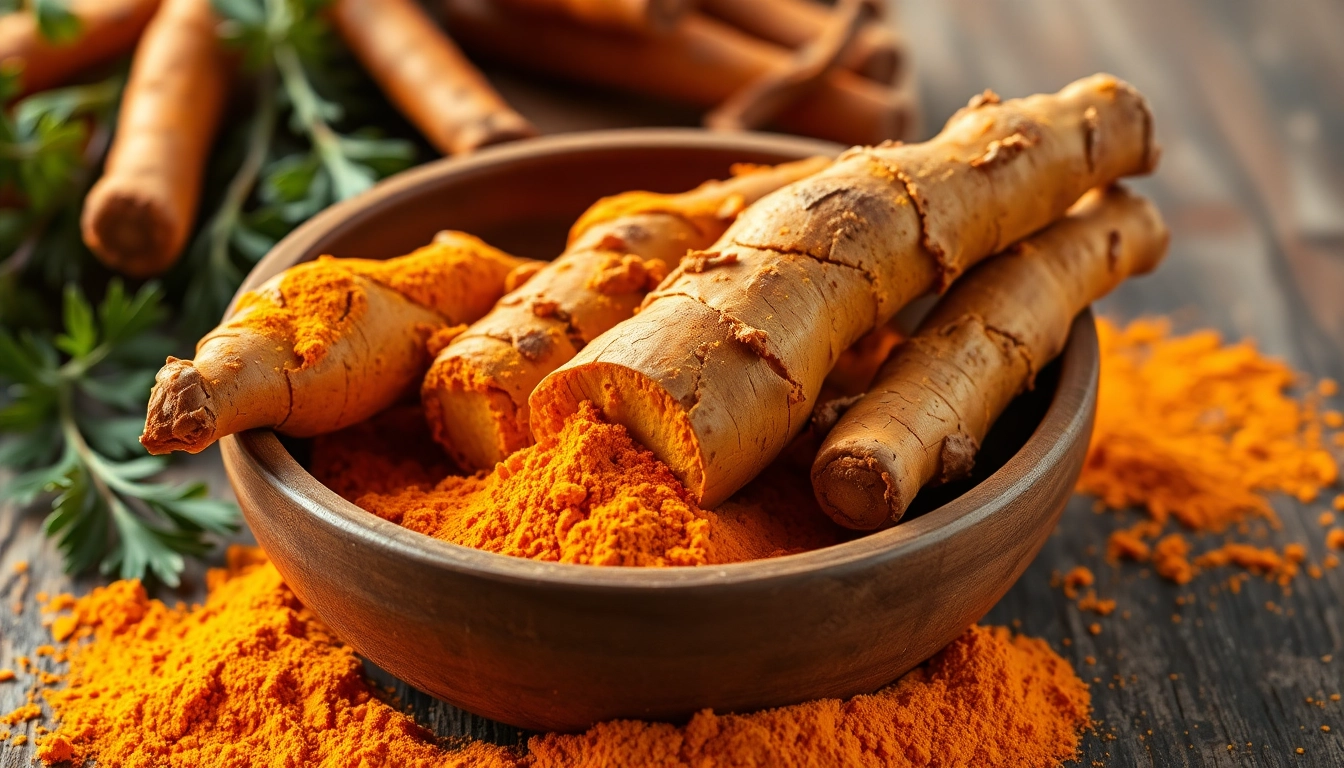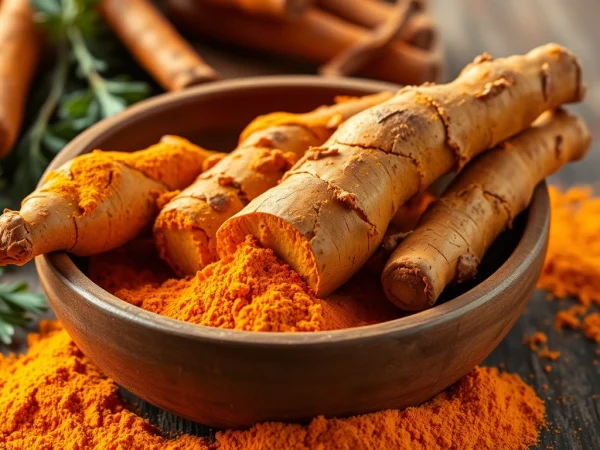Health Benefits of Turmeric Root: Nature’s Golden Antiinflammatory
Understanding Turmeric Root
What is Turmeric Root?
Turmeric root, scientifically known as Curcuma longa, is a vibrant yellow-orange rhizome that originates from Southeast Asia. A close relative of ginger, it is a staple in many culinary traditions, particularly in Indian and Southeast Asian cuisines. Turmeric root is not only valued for its flavor but also widely recognized for its extensive health benefits, attributed largely to its active compound, curcumin. As a medicinal plant, turmeric has a long history of use in traditional medicine, often recognized for its potent properties.
Historical Uses of Turmeric Root
The use of turmeric dates back over 4,000 years, primarily in India, where it has been employed not only as a culinary spice but also as a vibrant dye and a key ingredient in Ayurvedic medicine. Ancient texts describe turmeric as a valuable herb for enhancing digestion, healing wounds, and treating various ailments, such as respiratory conditions and liver disorders. Beyond India, cultures in China and other regions have utilized turmeric for its potential health-promoting properties, highlighting its significance in global traditional medicinal practices.
Nutritional Profile of Turmeric Root
Turmeric root is rich in various nutrients, including dietary fiber, vitamins, and minerals. Most notably, it contains curcumin, which contributes to its distinctive color and potent health benefits.
- Vitamins: Turmeric is a good source of vitamin C, vitamin E, and various B vitamins, which play crucial roles in immune function and energy metabolism.
- Minerals: It also contains essential minerals such as iron, potassium, and magnesium, vital for numerous bodily functions.
- Phytonutrients: Curcumin is the most researched compound, known for its strong anti-inflammatory and antioxidant properties.
Health Benefits of Turmeric Root
Anti-inflammatory Properties of Turmeric Root
One of the most significant benefits of turmeric root lies in its anti-inflammatory properties. Curcumin is known to inhibit various molecules that play a role in inflammation, making it beneficial for conditions like arthritis and other inflammatory disorders. Numerous studies have indicated that curcumin can significantly reduce the levels of inflammatory markers in the body, providing a natural approach to managing chronic inflammation.
Antioxidant Benefits of Turmeric Root
Turmeric root is renowned for its powerful antioxidant properties. Antioxidants combat free radicals—unstable molecules that can cause oxidative stress in the body—thereby protecting cells from damage. Regular consumption of turmeric may enhance the body’s overall antioxidant capacity, contributing to a lower risk of chronic diseases and promoting longevity.
Cardiovascular Health and Turmeric Root
Emerging research suggests that turmeric root can play a role in maintaining cardiovascular health. By improving endothelial function, curcumin helps regulate blood pressure and supports overall heart health. Furthermore, turmeric has the potential to lower cholesterol levels, reducing the risk of atherosclerosis and heart disease.
How to Use Turmeric Root
Fresh Turmeric Root in Recipes
Incorporating fresh turmeric root into your diet can be simple and enjoyable. Here are some practical ways to use it:
- Teas: Fresh turmeric can be steeped in hot water to create a soothing tea, often combined with ingredients like lemon and honey for added flavor.
- Smoothies: Blending fresh turmeric into a smoothie enhances its nutritional profile and provides a vibrant color.
- Cooking: Use grated turmeric in stir-fries, soups, or marinades to impart its earthy flavor and health benefits.
- Baking: Fresh turmeric can be added to cakes and muffins, offering a unique twist and an extra health boost.
Supplements and Extracts of Turmeric Root
For those seeking concentrated doses, turmeric supplements and extracts are widely available. These often contain higher levels of curcumin than the root itself and may also include additional ingredients to enhance absorption, such as black pepper extract (piperine). It is advisable to consult a healthcare professional before starting any supplement regimen to determine appropriate dosages and ensure safety.
Guidelines for Daily Intake of Turmeric Root
The optimal daily intake of turmeric root can vary based on individual health circumstances and dietary needs. As a general guideline, consuming about 1-2 teaspoons of fresh turmeric root or 400-600 mg of curcumin extract per day is often recommended. However, clinical studies typically utilize higher doses, so adjusting intake based on specific health goals may be necessary.
Potential Side Effects of Turmeric Root
Common Side Effects of Turmeric Root
While turmeric root is generally considered safe for most people, it can cause mild side effects in some individuals. These may include:
- Gastrointestinal Issues: Some individuals may experience stomach upset, bloating, or diarrhea when consuming high doses of turmeric.
- Allergic Reactions: A small number of users may be allergic to turmeric, experiencing skin rashes or other symptoms upon consumption.
Drug Interactions with Turmeric Root
Turmeric root may interact with various medications, particularly blood thinners and anti-diabetes medications. It’s crucial to discuss any plans to incorporate turmeric into your diet with a healthcare provider, especially if you are taking medications.
When to Avoid Turmeric Root
Certain populations should exercise caution when using turmeric root. Pregnant or breastfeeding women and individuals with gallbladder disorders or those about to undergo surgery should consult a healthcare professional before use. Additionally, those on specific medications may need to avoid turmeric to minimize interaction risks.
Where to Buy Turmeric Root
Choosing Quality Turmeric Root
Not all turmeric products are created equal. When buying fresh turmeric root, look for firm, unblemished roots with a vibrant color. For powdered forms, choose organic options where possible to avoid contaminants. The label should also confirm that it contains a high curcumin content, which indicates its quality and efficacy.
Local and Online Sources for Turmeric Root
Fresh turmeric root can often be found at local farmers’ markets, health food stores, or specialty grocery stores. Online retailers also offer a variety of turmeric products, ranging from fresh roots to powders and supplements. Ensure to read reviews and ratings to identify reputable sources, such as Turmeric Root that guarantee high-quality products.
Understanding Pricing for Turmeric Root
Pricing for turmeric root can vary widely based on quality, sourcing, and form. Fresh turmeric typically ranges from $1 to $3 per pound, while dried turmeric powder can cost about $5 to $15 per pound depending on organic certification and brand reputation. Bulk purchasing may offer cost benefits, particularly for those who integrate turmeric regularly into their diet.





